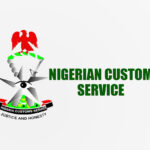The Nigeria Customs Service (NCS) has revealed that it is prioritising non-intrusive inspection at the country’s seaports in order to achieve its revenue target.
In a statement on Sunday, quoting Babatunde Olomu, the Customs Area Controller of Apapa Area Command, the NCS said the command was capable of achieving its N2.3 trillion revenue target for 2024 while prioritising modern customs practices like non-intrusive inspection and physical examination when necessary.
The statement reads in part: “Under Controller Olomu’s leadership, the command has applied certain tactics to enhance revenue collection and efficiency, building upon the successes of his predecessor. These efforts have strengthened the command’s position as a flagship unit of the Nigeria Customs Service.
“To achieve the target, the command has set proactive monthly, weekly and daily revenue targets of N193bn, N44bn and N8.9bn respectively. In the first quarter of 2024, the command surpassed its target with a collection of N489bn. In April, it generated N182bn, and in May, N175bn was collected.
- NIGERIA DAILY: Why Malnutrition Is Increasing In Northern Nigeria
- Ondo gov’ship: PDP picks Akingbaso as Ajayi’s running mate
“Although there was a slight drop in revenue collection in May, we are confident that the command will be able to generate N200bn in June, as a result of the interventions in place.”
We will make Coleman, others local champions – Adelabu
The Minister of Power, Chief Adebayo Adelabu, has said that the government is poised to support local manufacturers like Coleman Wires and Cables Limited, the largest manufacturer of wires and cables in West Africa, to reduce the huge spending on foreign exchange.
He said, “Our focus as a government is to have 100 per cent import substitution to reduce the pressure on our currency. We can also produce in excess and earn foreign exchange from exports. 80 per cent of forex earnings come from crude oil exports, and we are determined to change that.”
He noted that the sustainability of the power sector was the government’s priority, hence that the government would patronise Coleman across the power sector value chain: generation, transmission and distribution.
He said, “There is no segment of the power sector that doesn’t use your cables. The demand is there. You are big, but there is still a need for expansion to meet the local demand. I am happy with the quality of your products, and the government is ready to support you.”

 Join Daily Trust WhatsApp Community For Quick Access To News and Happenings Around You.
Join Daily Trust WhatsApp Community For Quick Access To News and Happenings Around You.


